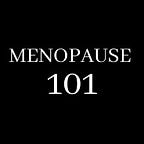What is Premature Menopause?
By Dr. Joy’El Ballard
Most simply put, premature menopause is the loss of ovarian function before the age of 40 (the average age of natural menopause is 52). Premature menopause is rare and occurs in just about one percent of people who menstruate in the U.S.. The symptoms of premature menopause are similar to the symptoms women experience during perimenopause and natural menopause, which can include irregular periods or no periods, hot flashes, mood changes, anxiety or depression, sleep disturbances, sexual dysfunction and vaginal dryness. Premature menopause can be spontaneous or medically induced. It can be medically induced by surgical removal of both ovaries, chemotherapy, or radiation in the pelvic region. If it is medically induced, women typically skip perimenopause and go straight into menopause.
Spontaneous causes of premature menopause are most often genetic (i.e. chromosomal defects like Turner syndrome), metabolic (i.e. diabetes), autoimmune(i.e. thyroiditis), smoking, or, in some cases, unknown.
If there is no obvious cause, premature menopause is referred to as Premature Ovarian Insufficiency (POI), formerly known as premature ovarian failure. The term “failure” was changed to “insufficiency” because researchers found that some women have transient function of ovaries and may sporadically ovulate. It is a condition that occurs in young women, sometimes as young as their teens, characterized by skipping many periods in a row or having no periods at all. POI is most often diagnosed when a healthcare provider observes a patient with infrequent or no periods and the presence of menopausal symptoms. A blood test that measures a women’s Follicle-Stimulating Hormone (FSH) may confirm. FSH is the hormone that controls the menstrual cycle and stimulates the growth of eggs in the ovaries. FSH becomes persistently elevated in menopause. When the FSH level is elevated on two occasions, at least one month apart, this confirms POI.
Premature menopause or POI affects all women differently though it is common to have higher incidence of mental health issues like anxiety or depression along with a greater degree of sexual dysfunction compared to women who undergo natural menopause. One study of women with premature menopause found mood disorders and sexual problems were the most distressing among women with this diagnosis.
How do I know if I’m in premature menopause?
If you are younger than 40, have skipped at least three periods in a row (and are not using contraception), your healthcare provider can evaluate your condition — once there is confirmation that you are not pregnant. Your physician will need to know if you have any preexisting medical conditions and if there is family history of premature menopause. A number of blood tests can determine if you have POI, premature menopause, or other conditions that can cause similar symptoms, for example, a thyroid disorder.
If you are younger than 40 and anticipate medical treatment that involves chemotherapy or radiation to the pelvis for cancer or surgical removal of both ovaries, make sure to discuss with your doctor the expectations of premature menopause, in addition to your fertility options.
What are the health risks of premature menopause and POI?
- Infertility. Since there is loss of ovarian function, spontaneous pregnancy is rare. About five percent of women with POI can get pregnant on their own. If you’re experiencing premature menopause and also interested in childbirth — or just want the option open — it’s important to have a conversation with your gynecologist or a fertility specialist to explore options of ovulation induction, in vitro fertilization (IVF) and egg donation to achieve pregnancy. Due to the lack of ovarian function, many women with premature menopause who wish to carry a pregnancy use donor eggs.
- Osteoporosis. Women with premature menopause are at risk of early low-bone density or bone loss. Therefore, they are at risk for fractures.
- Cardiovascular disease. Premature menopause may increase the risk of heart disease. There are multiple estrogen receptors throughout the cardiovascular system and the estrogen hormone has a positive influence on the heart, blood vessels and levels of the high-density lipoprotein (HDL) cholesterol which is the “good” cholesterol. Therefore, women in premature menopause lose the protective effects of estrogen which puts them at risk of high blood pressure, chest pain, high cholesterol and ultimately heart disease.
How is premature menopause and POI treated?
Before considering treatment, your healthcare provider should identify the cause of premature menopause. In addition to treating the underlying cause, hormone therapy (HT) may be recommended. This includes a combination of estrogen and progesterone if a woman still has a uterus (estrogen alone may be prescribed for women without a uterus). HT is usually recommended until age 50–51, which is around the age that menopause would begin naturally. Remember that hormone therapy has both pros and cons, which should be discussed with your physician to determine the best option for you.
In addition to treatment, lifestyle changes are also important during premature menopause to protect the health of your heart, bones, and brain. Eating a balanced diet, exercising, avoiding smoking, and limiting alcohol are all beneficial in decreasing health risks associated with premature menopause. Calcium and Vitamin D supplementation may also be prescribed to protect your bones.
Also important: Tending to your mental health. The diagnosis of premature menopause can take an emotional toll and it’s important to have access to support groups and therapy, in addition to the support of your healthcare team, to help you manage your feelings — and to know you’re not alone.
The information provided on StateOfMenopause.com is not intended and should not be construed as medical advice, treatment, or diagnosis. Always seek the guidance of a qualified healthcare provider with any questions or concerns regarding your health.
